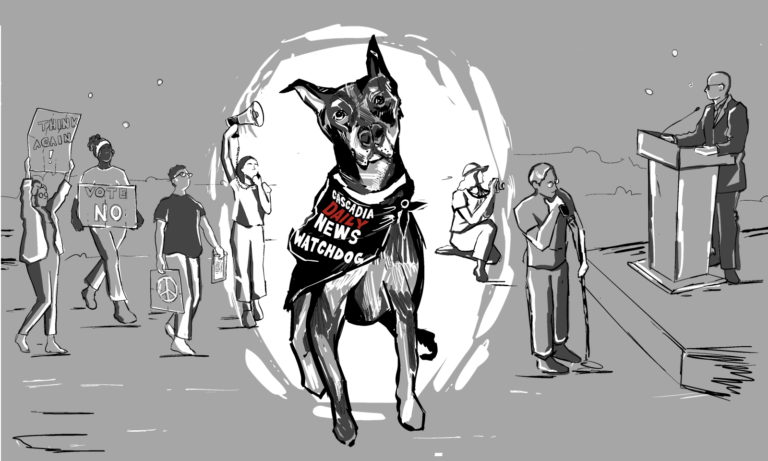A Washington State Supreme Court visit to Bellingham highlighted the court’s ongoing commitment to diversity, equity and inclusion, amid federal pushback against such efforts.
The nine justices held a Q&A in Western Washington University’s Wilson Library on Wednesday, Feb. 19, moderated by Ceci Lopez, the director of the university’s Center for Law, Diversity & Justice. Questions ranged from the court’s relationship with the governor and the state Legislature to its relationship with the U.S. Supreme Court, but diversity came up as a prevailing theme.
As part of the Traveling Court outreach program, justices travel to communities around Washington every year to answer questions from students and community members and hear cases in “community settings,” according to a news release. On Thursday, Feb. 20, the justices convened in the Wilson Library Reading Room to hear arguments for two cases: State v. Thompson, 103338-9 and State v. Abrams, 103058-4.

The court is diverse, and nearly all justices referenced that fact: the nine-person body includes five justices of color, six women, and LGTBQ+ and disability representation. Justices listed many firsts in their introductions to the audience: Justice Raquel Montoya-Lewis is the first Indigenous person on the Supreme Court, Justice Mary I. Yu was the first Latina, Asian and member of the LGBTQ+ community, and Justice G. Helen Whitener was the first Black female justice.
Justice Barbara Madsen, on the court for 32 years, recalled being only one of 10 women in her law school of 120 students, and following school, her challenges to get a job as a female attorney. She became the third woman to sit on the court in its history. When longest-serving Justice Charles W. Johnson joined the court, he recalled that there was only one female justice.
That diversity is seen by the justices as a strength: “Our lenses are rather diverse. It’s very intersecting and we try to consume all of our citizenry in our decisions, try to cover as many as possible in coming up with our decisions on this board,” Whitener said.
When Lopez asked the justices for their reaction to the federal government’s push against diversity, equity and inclusion, Montoya-Lewis said she found it difficult to answer this question “in a way that isn’t just expressing rage and frustration.”

President Donald Trump issued a range of executive orders attacking DEI in January, which terminated all DEI programs in the federal government, pushed private companies to end DEI practices and eliminated affirmative action practices for federal contractors.
“We’re not talking about people getting jobs they have not earned,” Montoya-Lewis said. “We are talking about ensuring that people who are qualified are considered.”
She recalled after she was appointed to the Supreme Court, the first question a reporter asked her was how she would respond to people who would call her an “affirmative action appointment.” (The journalist has since apologized, she said.)
“The true work of equity is enormous and difficult,” she said. “… You can say that you’re including people, but if you’re not actually doing the work of equity and inclusion, you’re not including people.”
Montoya-Lewis said the community can continue to do equity work “without having the support of the federal government.”
“We have to figure out how to continue that work,” she said. “The hardest part is there’s not going to be federal dollars.”
Yu emphasized that as a person of color in a position of power, she wanted people to hear from her: “Regardless of what anybody says … nobody’s going to erase me and my story and the fact that racism exists,” she said.
Charlotte Alden is CDN’s general assignment/enterprise reporter; reach her at charlottealden@cascadiadaily.com; 360-922-3090 ext. 123.




